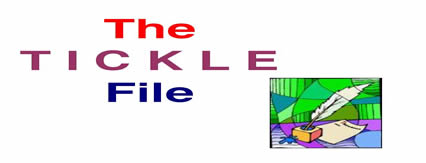
|
The Tickle File is ftm's daily column of media news, complimenting the feature articles on major media issues. Tickle File items point out media happenings, from the oh-so serious to the not-so serious, that should not escape notice...in a shorter, more informal format.
We are able to offer this new service thanks to the great response to our Media Sleuth project in which you, our readers, are contributing media information happening in your countries that have escaped the notice of the international media, or you are providing us information on covered events that others simply didn't know about. We invite more of you to become Media Sleuths. For more information click here. |
Hot topics click link for more
Objectivity in television news is difficult to measure. We’ll know it when we see it, is commonly offered. Some argue, certainly in the present, it’s a fools errand because news viewers seem attracted to partiality and partisan affinity. Still, within serious journalism, objectivity is a meaningful goal.
An opinion survey conducted by measurement institute Median SK (January-March 2018), published this week (June 5), showed only slight differences over the past year. Public broadcaster RTVS (TVS) was cited as objective in its news presentations by 25.3% of the sample, almost unchanged from 25.5% one year on. TV Markiza followed at 23.5%, down from 25.3%. Next was TV Joj, 18.4% finding its news programs objective, up notably from 16.1%. Lower was TA3, 15.8% from 17.0%. The percentage of respondents answering “don’t know” increased slightly to 13.5% from 13.2% and “other” remained the same at 2.9%. (See more about TV news here)
RTVS has, in recent months, faced criticism from some quarters about its news objectivity. The subject, generally, has become quite emotional since the February murder of Slovak journalist Jan Kuciak, still under investigation. Public uproar at the unconvincing official response led to political repercussions, at least for a moment, but authorities seem more intent on pursuing journalists than murder suspects. (See more about media in Slovakia here)
After something of a house-cleaning at the RTVS newsroom, followed by several resignations, General Director Jaroslav Reznik is facing an onslaught for being too close to the government and important politicans. "It is unacceptable for politicians to interfere in the functioning of a public institution and to abuse the news subjects that are in RTVS jurisdiction," said Culture Minister Lubica Lassakova in a statement after meeting with Mr. Reznik, quoted by AFP (June 1).
The controversial hiring of Marek Tapak as RTVS programming director has proven difficult for Mr. Reznik to defend. Mr. Tapak comes from conspiracy theory-laden online radio station Slobodny Vysielac. “From my point of view, that does not disqualify him,” said Mr. Reznik, quoted by news portal Aktualne.sk (June 5). "Time will show that we are right. We can prove that the news will be balanced, objective and fast and will be interesting.”
Every publisher of any scale has learned that a digital future means video. Part of this learning is from smartphone users turning away from text (that painful, exhausting process called reading) to moving pictures. The other part, arguably more important to publishers, is the rush to get more digital ads on more smartphones. The logic is indisputable.
German news magazine Bild, published by Axel Springer, created several live video streams. Regional media regulator Medienanstalt Berlin-Brandenburg (MABB) and the federal supervisor of media authorities (ZAK) noted this and asked Axel Springer to comply with the law and apply for TV licenses. Axel Springer refused. The regulators have now banned the Bild Live streams, reported media portal DWDL.de (May 30). (See more about media in Germany here)
The Bild Live streams are “aired regularly and frequently,” disagreed MABB deputy director Marco Holtz, quoted by Der Tagesspiegel (May 31). “But from our point of view, the streams fall into the legal framework defined by the term broadcast schedule.” He also mentioned the “broad impact and suggestive power” of the video service, by implication “influence on opinion formation.” (See more about streaming media here)
"We are of the opinion that the contested formats in their current form are not broadcasting requiring a license,” said the Axel Springer statement "The moving-image offers in question are neither intended for simultaneous reception nor are they distributed along a transmission schedule.” German publishers vociferously resist any form of state regulation and Axel Springer is pursuing remedies through the courts, which could take several months.
|


